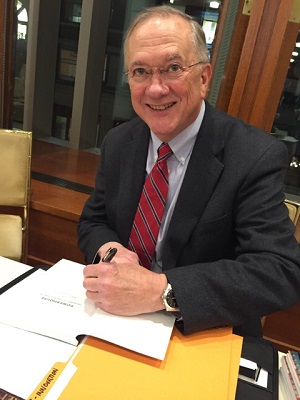
The American Marketing Association recently convened a diverse group of brand builders to address one of the most significant brand issues of the day – disruption and the threat it poses to established brands at New York’s Harvard Club. The panelists, whose members represented a global brand, GE, a firm that maps changes in the corporate brand ecosystem, Tenet Partners, a sonic branding firm, Man Made Music, and the Institute of Culinary Education, along with insights from moderator and Columbia University professor Don Sexton, eagerly joined in a conversation that ranged widely across contemporary branding issues.
Tenet’s Chairman, Jim Gregory (pictured here), set the course by telling the group of some 75 marketers, “Marketing is fundamentally shifting and we’re seeing the CMO job evolving to include P&L responsibility, oversight of cultural engagement internally, thinking about new product and service design, and seeking for new opportunities broadly across global markets. These are not easy challenges for marketers.”
here), set the course by telling the group of some 75 marketers, “Marketing is fundamentally shifting and we’re seeing the CMO job evolving to include P&L responsibility, oversight of cultural engagement internally, thinking about new product and service design, and seeking for new opportunities broadly across global markets. These are not easy challenges for marketers.”
A column theme, as related by Gregory, is the constant need to align the brand with the customer experience. “It’s very important to create alignment between your brand, the business process, corporate culture and the way you communicate to maximize the value of your brand.”
Sexton, who had recently attended a similar session where panelists offered four views of disruption, interjected, asking each panelist to offer their definition.
RELATED: Experience Automation and How to Get It Right
“Disruption is not about noise,” said Kevin Perlmutter, Chief Strategist of Man Made Music. “It’s actually about connecting in an emotional way with people, which is very hard to do as you have to think about how people make decisions when intercepting your communications.” He suggested that Tindr is a microcosm between the relationship between marketing and consumers. “It’s this tremendous amount of thoughtfully prepared content that’s vying for your attention and this high rate of rejection. As marketers we have to think of ways to get consumers’ attention before we’re rejected.”
“Disruption is not about noise, it’s actually about connecting in an emotional way with people, which is very hard to do as you have to think about how people make decisions when intercepting your communications.” – Kevin Perlmutter, Chief Strategist of Man Made Music
For the Institute of Culinary Education (ICE), disruption applies on several levels. “Primarily it’s about the way people receive the message or advertisement. Once we could put TV ads out and expect a result. Now somebody is making a decision as to how to consume it and when in their lives to consume it,” said Brian Aronowitz, CMO, whose recent marketing focus has been partnering on culinary activations with major brands like IBM and the NFL. “We still run a blend of traditional and new media, but we realize [that] we’re sitting on this mountain of content, and are trying to harness it to work for us and brand partners.”
In 2013, ICE launched as a new brand – “Find Your Culinary Voice” – focused on celebrating the creative voice in each of us through food. “When we put that out into the market, big brands said they wanted to activate with us. For us, it’s about the reception of the message, which is disruptive as to how they receive it as we’re providing culinary information in a different light,” added Aronowitz.
One hundred thirty year-old GE was founded on disruption with its roots in Thomas Edison’s light bulb. “Disruption, in a really positive way, is in our DNA,” noted Alexa Christon, Head of Media. “Disruption is synonymous with innovation and invention in a relentless drive to find the white space in experience and to define needed solutions.”
SEE ALSO: Made for Me – 3 Ways Brands Can Achieve Successful Personalization
In the US, GE is well known for appliances and cooking products; 70% of US homes have GE appliances. “That’s how consumers touch us,” added Christon. “But in the last 10 years, GE has made a real drive to innovate and change that perception to one of being a digital technology company. We are now working on inviting people in, consumers, engineers and recruits, to experience how GE is innovating to meet changing global needs. As marketers we’re absolutely curious. We’re always looking for what’s around corners, for what’s next in media and how to have a meaningful dialogue, such as represented in GE’s current ‘Owen’ TV campaign.”
“Disruption is synonymous with innovation and invention in a relentless drive to find the white space in experience and to define needed solutions.” – Alexa Christon, Head of Media, GE
Sexton asked Perlmutter to address the issue of emotional bonding through music and how it fits into his approach to brand building projects. Recognizing a great question he said, “We definitely think about the emotional reactions we want people to have. So much has changed with how people connect with brands and content. The most important thing to remember is how decisions are made, especially in dealing with disruption and the moment of connection. Ninety percent of decisions are made in the fast subconscious emotional side of the brain so we have to find ways to help people react emotionally. Music is a short cut to emotion.”
Gregory reiterated, “Disruption is a constant. It is happening everywhere all the time but especially right now in our field with so many things going on- from the way data is collected and analyzed to mobile, digital, virtual. The velocity and volume of disruption is greater than ever and keeping a handle on that is a critical aspect of brand building.”
Image: Todd Quackenbush